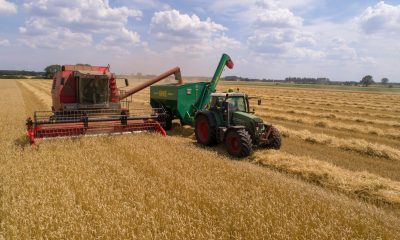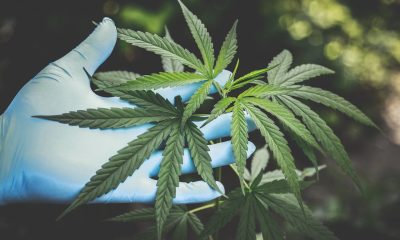Africa
1.8% Economic Growth Expected in Morocco in Q2
Instead of the 15.2% growth recorded in the second quarter of last year, Morocco should expect a growth rate of only 1.8% at the end of the second quarter of the current year. The HCP announces it in its note of conjuncture of the first quarter 2022 and perspectives for the second quarter. It recalls that the current context is, in all respects, very different from that of last year.

Instead of the 15.2% recorded in the second quarter of last year, Morocco should expect a growth rate of only 1.8% at the end of the second quarter of the current year.
It is the High Commission for Planning (HCP) which announces it in its note of conjuncture of the first quarter 2022 and perspectives for the second quarter. The institution recalls that the current context is, in all respects, very different from that of last year. Starting with this year’s poor agricultural season, which would result in a 12.9% drop in agricultural value added in the second quarter of 2022.
In addition, the evolution of the world economy will continue to depend on the epidemiological situation, particularly in China (the only constant), as well as the repercussions of the Russian-Ukrainian conflict, which will weigh on the growth prospects of the world economy throughout 2022.
Not only that, but rising commodity prices, particularly for energy and agricultural products, combined with disruptions in global supply chains, are already weighing heavily on the recovery of advanced economies.
In this context, foreign demand addressed to the national economy would show an increase of 3.1% in the second quarter of 2022, in annual variation, instead of 20.7% during the same period of last year, reveals the HCP. Domestic demand is expected to accelerate slightly in the second quarter of 2022, contributing 3.3 points to overall economic growth.
Read more about the economic situation in Morocco and find other economic news from around the world with the Born2Invest mobile app.
Household spending weighed down by inflationary pressure
This domestic demand will be driven in particular by the continued strengthening of public spending, while household spending will continue to be affected by continued strong inflationary pressures.
On the business side, value added excluding agriculture is expected to grow by 4.1% in the second quarter of 2022, year-on-year (see graph). It will be driven in particular by the tertiary sector, which is expected to contribute 2.4 percentage points to overall economic growth. In the secondary sector, mining activities are expected to return to positive growth, leading to a 2.8% increase in the value added of secondary industries.
In short, the Kingdom would fare better than in the first quarter of 2022, when economic activity still showed resilience, even though agricultural value added would have contracted by 12.1% (see chart). According to the HCP, economic growth was 1.2%, driven mainly by a 3.3% increase in value added outside agriculture.
The tertiary sectors, which continued to benefit from a favorable base adjustment effect, contributed 1.9 percentage points to GDP growth, driven by the continued recovery of tourism activities.
In annual variation, the value added of accommodation and food services would have increased by 53.4% in the first quarter of 2022, in the wake of the improvement in the epidemiological situation in Morocco and the reopening of air borders from February 7th, 2022.
Economic activity still resilient
Growth in secondary activities is expected to accelerate slightly, raising its contribution to overall GDP growth to +0.5 percentage points, from +0.4 in the same period of 2021. Mining value added is estimated to have fallen by 4.2% in the first quarter of 2022, in annual variation, after having risen by 5.2% a year earlier.
Non-metallic mineral extraction activities are estimated to have fallen by 5.3% in the context of a decline in demand from local processing industries. In contrast, manufacturing activity would have continued to recover at a rate of 2.7 percent in the first quarter of 2022, up from 1.6 percent in the same period of 2021.
Despite the increase in production costs, linked to the rise in raw material prices and supply problems, the activity of the manufacturing industries is expected to have held up well, thanks in particular to the strengthening of the textile and metal and metallurgical industries.
On the other hand, the chemical industries, which had been particularly dynamic in 2021, would have seen a 2.2% reduction in their value-added in a context of a fall in the quantities of phosphate derivatives exported, largely offset by the increase in their export sales price.
Overall, the value of exports increased 29.5% compared to the same period last year. At the same time, the value of imports jumped by 37% over the same period, which caused a decline of 3.5 points in the coverage rate in the first quarter
__
(Featured image by AbsolutVision via Pixabay)
DISCLAIMER: This article was written by a third party contributor and does not reflect the opinion of Born2Invest, its management, staff or its associates. Please review our disclaimer for more information.
This article may include forward-looking statements. These forward-looking statements generally are identified by the words “believe,” “project,” “estimate,” “become,” “plan,” “will,” and similar expressions. These forward-looking statements involve known and unknown risks as well as uncertainties, including those discussed in the following cautionary statements and elsewhere in this article and on this site. Although the Company may believe that its expectations are based on reasonable assumptions, the actual results that the Company may achieve may differ materially from any forward-looking statements, which reflect the opinions of the management of the Company only as of the date hereof. Additionally, please make sure to read these important disclosures.
First published in LES ECO.ma, a third-party contributor translated and adapted the article from the original. In case of discrepancy, the original will prevail.
Although we made reasonable efforts to provide accurate translations, some parts may be incorrect. Born2Invest assumes no responsibility for errors, omissions or ambiguities in the translations provided on this website. Any person or entity relying on translated content does so at their own risk. Born2Invest is not responsible for losses caused by such reliance on the accuracy or reliability of translated information. If you wish to report an error or inaccuracy in the translation, we encourage you to contact us.

-

 Biotech1 week ago
Biotech1 week agoVytrus Biotech Marks Historic 2024 with Sustainability Milestones and 35% Revenue Growth
-

 Crypto3 days ago
Crypto3 days agoRipple Launches EVM Sidechain to Boost XRP in DeFi
-

 Africa1 week ago
Africa1 week agoCôte d’Ivoire Unveils Ambitious Plan to Triple Oil Output and Double Gas Production by 2030
-

 Business1 week ago
Business1 week agoThe TopRanked.io Weekly Digest: What’s Hot in Affiliate Marketing [NordVPN Affiliate Program Review]
























